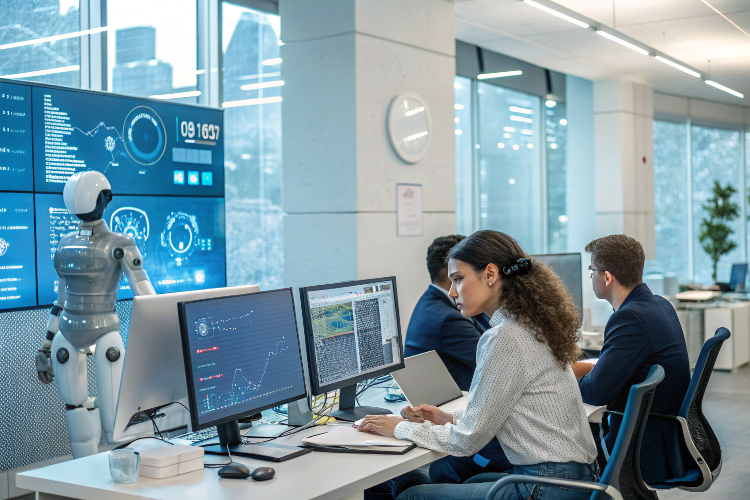Blog
How AI is Revolutionizing Businesses in 2025 ?
Artificial Intelligence & Automation ▪ 2025-03-18

Artificial Intelligence (AI) has transformed the business landscape, driving efficiency, automation, and innovation across various industries. In 2025, AI is more powerful and accessible than ever, enabling businesses to streamline operations, enhance customer experiences, and make data-driven decisions with unprecedented accuracy. This blog explores how AI is revolutionizing businesses in 2025 and why companies that adopt AI are gaining a competitive edge.
The Growing Influence of AI in Business
AI is no longer a futuristic concept but a critical component of modern business strategies. Companies are leveraging AI to improve productivity, optimize costs, and gain valuable insights from data. From customer service chatbots to AI-powered analytics, the applications of AI in business are vast and continually expanding.
1. AI-Driven Automation and Workforce Transformation
Automation powered by AI is streamlining business operations and reducing human effort in repetitive tasks. Here’s how AI is transforming the workforce:
Intelligent Process Automation (IPA): AI-driven automation tools are handling routine business processes such as data entry, invoice processing, and customer support ticketing.
AI-Powered HR Solutions: AI is assisting HR teams in talent acquisition, employee engagement, and performance analysis.
Smart Virtual Assistants: AI-powered virtual assistants like chatbots and voice assistants are managing customer queries, scheduling meetings, and improving efficiency.
2. AI in Customer Experience Enhancement
Customer experience (CX) is a top priority for businesses, and AI is playing a significant role in making interactions smoother and more personalized.
Chatbots and Virtual Agents: AI-driven chatbots provide 24/7 customer support, reducing response times and enhancing customer satisfaction.
Hyper-Personalization: AI analyzes customer data to deliver personalized product recommendations and tailored content.
Sentiment Analysis: AI monitors customer feedback and social media interactions to gauge customer sentiment and improve service quality.
3. AI-Enhanced Marketing Strategies
Marketing is undergoing a digital revolution, with AI enabling smarter and more effective campaigns:
Predictive Analytics: AI analyzes consumer behavior to predict trends and optimize marketing campaigns.
Automated Content Generation: AI tools generate high-quality content, blog posts, and social media updates based on data-driven insights.
AI-Powered Ad Targeting: AI ensures ads reach the right audience at the right time, improving conversion rates.
4. AI in Financial Management
AI is making financial processes more accurate, secure, and efficient for businesses.
Fraud Detection: AI identifies fraudulent transactions and unusual activities in real-time, ensuring financial security.
Automated Bookkeeping: AI-powered software handles financial records, reducing human errors and improving accuracy.
AI-Based Investment Strategies: Businesses use AI-driven financial models to make informed investment decisions and maximize profits.
5. AI in Supply Chain and Logistics Optimization
AI is optimizing supply chains and logistics, reducing costs, and enhancing efficiency:
Demand Forecasting: AI analyzes market trends to predict demand fluctuations and optimize inventory management.
Smart Route Planning: AI-powered logistics systems optimize delivery routes, reducing transportation costs and improving delivery speed.
Warehouse Automation: AI-driven robots and automated systems are managing warehouses, ensuring efficient inventory handling.
6. AI in Healthcare and Business Wellness
Healthcare businesses are benefiting from AI innovations that improve patient care and operational efficiency:
AI-Assisted Diagnostics: AI-powered systems analyze medical images and patient data for faster and more accurate diagnoses.
Telemedicine and Virtual Health Assistants: AI is making healthcare more accessible through remote consultations and AI-driven health monitoring.
Employee Wellness Programs: Businesses use AI to promote workplace wellness, analyzing employee health data and offering personalized wellness solutions.
7. AI-Powered Cybersecurity Measures
Cybersecurity threats are evolving, and AI is playing a crucial role in protecting businesses:
Threat Detection and Prevention: AI identifies potential cyber threats before they cause damage.
Automated Security Responses: AI-powered security systems respond to cyberattacks in real-time, minimizing risks.
Behavioral Analytics: AI detects unusual user behavior, preventing security breaches and insider threats.
8. AI in Retail and E-Commerce
The retail industry is leveraging AI to improve customer experiences and boost sales:
AI-Driven Product Recommendations: Personalized shopping experiences increase sales and customer engagement.
Smart Inventory Management: AI predicts demand and optimizes stock levels to reduce waste.
AI-Powered Visual Search: Customers can search for products using images, making online shopping more intuitive.
9. AI in Manufacturing and Industry 4.0
Manufacturing is entering a new era with AI-driven smart factories and industrial automation:
Predictive Maintenance: AI predicts equipment failures before they happen, reducing downtime and maintenance costs.
Quality Control and Inspection: AI-powered computer vision ensures product quality and detects defects in real-time.
Robotics and Automation: AI-driven robots improve efficiency and precision in production lines.
10. AI Ethics and Challenges in Business
Despite its numerous advantages, AI also brings ethical concerns and challenges that businesses must address:
Data Privacy and Security: Companies must ensure responsible data handling to avoid privacy breaches.
AI Bias and Fairness: AI algorithms must be trained to avoid biases in decision-making.
Regulatory Compliance: Businesses must comply with AI-related regulations and ethical guidelines.

